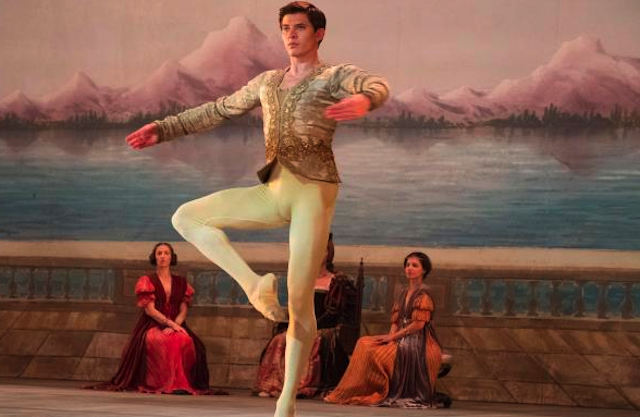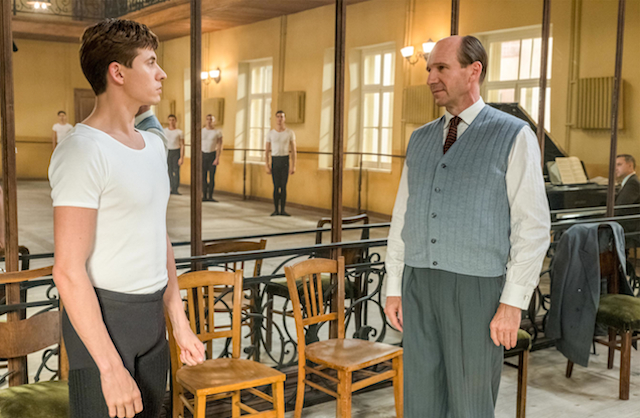CHICAGO – Patrick McDonald of HollywoodChicago.com appears on “The Morning Mess” with Dan Baker on WBGR-FM (Monroe, Wisconsin) on March 21st, 2024, reviewing the new streaming series “Manhunt” – based on the bestseller by James L. Swanson – currently streaming on Apple TV+.
History & Culture Co-Exist in Exemplary ‘The White Crow’
 Rating: 4.0/5.0 |
CHICAGO – In any ear for pop culture, the name Rudolf Nureyev is well known. A Soviet Russian-born ballet virtuoso nicknamed “Lord of the Dance,” RN lived large until he died, of complications due to AIDS at age 54 in 1993. But before that, he was born into poverty, danced into fame, and historically defected to the West in 1961. “The White Crow,” a new film directed by Ralph Fiennes, tells his story.
An unknown actor named Oleg Ivenko portrays Nureyev, and the title refers to the Russian term for outsider. The dancer was an ultimate lone wolf as portrayed in the film, seemingly separated from everything else by his blazing talent. Deftly directed by actor Ralph Fiennes – who also portrays Nureyev’s legendary teacher Alexander Ivanovich Pushkin – the timeline jumps from childhood through the early years as a Soviet sensation, to the Paris of 1961 at the moment of his defection. The film establishes the lone nature of the dancer, who focused his energy and his purpose toward the beauty of interpretative ballet. There is so much to his life after the defection, but the way Fiennes’ introduces the Nureyev of his film, there is a feeling of knowing him.
Rudolf Nureyev (Oleg Ivanko) was born on a Trans-Siberian train in the Soviet Union in 1938 to a lower class Tatar Muslim family. Discovering dance as a kid, he seeks the best instructors – including the prized teacher Pushkin (Ralph Fiennes) – to accelerate his education, delayed by World War II. After rising quickly through the Soviet ballet ranks, he travels to Paris on a cultural exchange that will change his life.

Oleg Ivanko as Rudolf Nureyev in ‘The White Crow’
Photo credit: Sony Pictures Classics
While there, he absorbs the city as if he’s physically ingesting it, constantly missing his KGB-enforced curfews. He meets some French dancers, who introduce him to Clara Saint (Adéle Exarchopoulos), a high-flying socialite defined by a recent tragedy. As he wows the City of Lights, he spends his nights with Clara and his new friends, which leads him to the defection of destiny.
The film shifts between its three timelines … childhood, early instruction, and Paris … to build the character of Nureyev, and the three contribute to his sense of his outsider intuition. All the eras show the ballet legend dancing on the edge of a knife, as the Soviet desire for supremacy included keeping tabs on their art treasures. But his will could not be denied, as portrayed it was separate from anything that possibly could have been a barrier – director Fiennes used open spaces and Nureyev’s singular form to symbolize this life status. He had to become who he was.
Oleg Ivenko is a revelation as the young Nureyev, looking remarkably like the RN of that era, and handling both the graceful ballet movement and varying emotional trial the dancer was put through. Nureyev was bi-sexual, and the way that Ivenko could seduce both men and women exposed some secrets to his character’s success. Adéle Exarchopoulos as Clara was another standout, playing a young adult woman of the early 1960s with poise and sophistication.

Nureyev and Mentor Pushkin (Ralph Fiennes) in ‘The White Crow’
Photo credit: Sony Pictures Classics
The ballet is portrayed, giving an idea of the arts sensation that singled out Nureyev. His defection was the first for a Soviet arts practitioner, and made headlines all around the world. The actual scene, which took place at a Paris airport, was as tense as a fictional spy thriller. What is striking about totalitarian governments like Soviet Russia was the waste of resources simply to keep their population “in line.” Losing Nureyev was huge for this country as it was, and Fiennes gives it proper context.
As the old ad slogan said, “what becomes a legend most?” For Rudolf Nureyev, it was the molecules of a journey that never was once wasted, both in his art and his excess. It is a lesson on the shortness of life’s breath, that to fill it with depth is to keep the blood flowing all the way until it decides to stop.
 | By PATRICK McDONALD |


